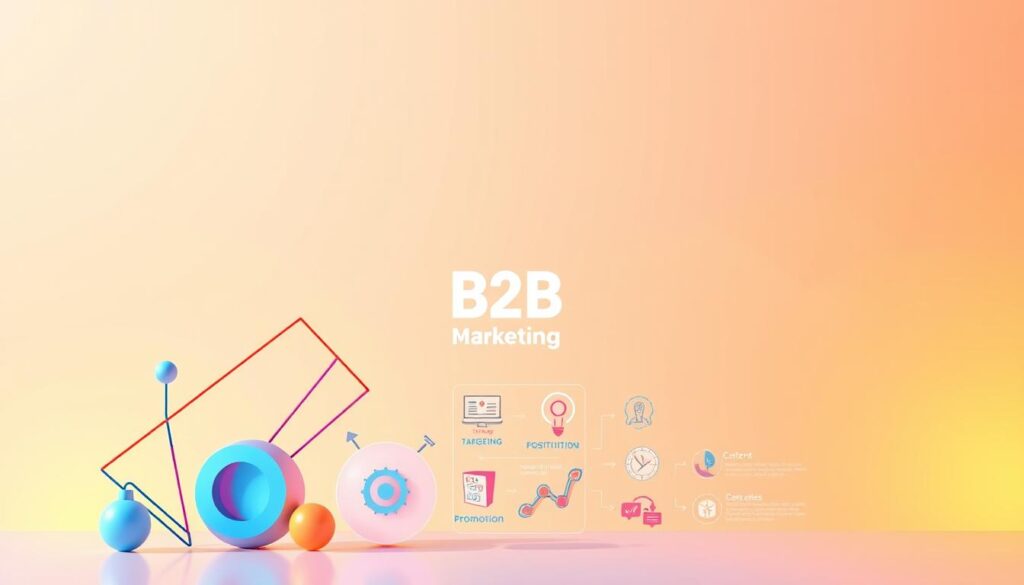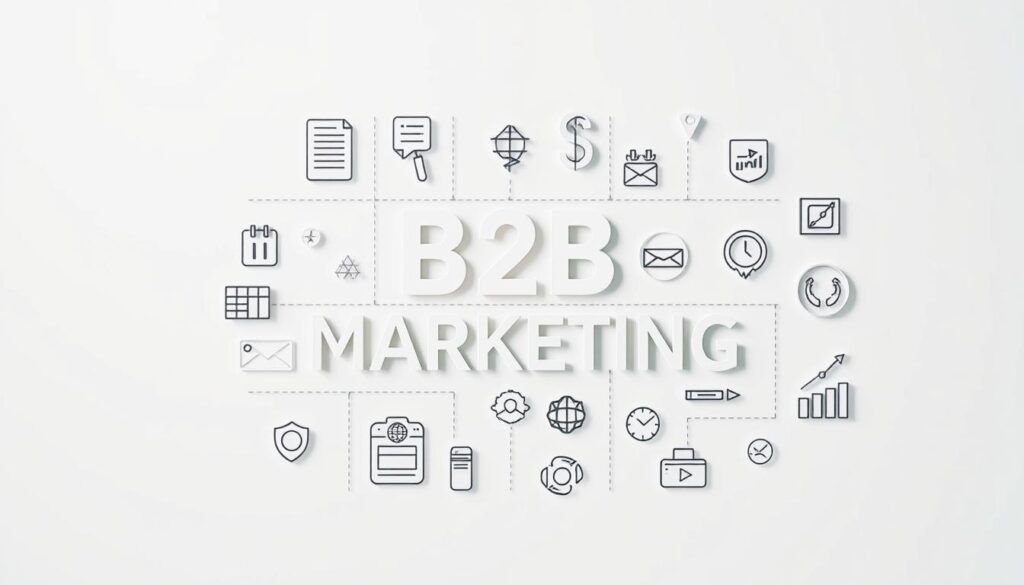In today’s competitive market, it’s key to know how to build a B2B marketing strategy. This is vital for companies wanting strong business relationships. Unlike the consumer market, B2B marketing focuses on understanding clients’ specific needs and challenges.
Creating a good strategy means making careful plans. These plans should cover creative, financial, and channel decisions. This ensures you reach your audience well.
Knowing your audience is the first step to successful B2B marketing. You need to find out who your buyers are. This lets you make your marketing fit their needs perfectly.
This knowledge is essential. It helps you deal with the complex world of B2B marketing. It also boosts your connection with your business audience.
Table of Contents
Key Takeaways
- Understanding your audience is key to success.
- Knowing your buyer personas helps target better.
- Good B2B marketing needs careful planning across channels.
- Clear goals are important for measuring success and improving tactics.
- Using data can greatly improve your marketing.
- A structured approach leads to better engagement and higher conversion rates.
Understanding the Basics of B2B Marketing
B2B marketing is about promoting products or services from one business to another. It aims to increase brand awareness and turn leads into loyal customers. Knowing the basics of B2B marketing is key to creating successful campaigns that connect with your audience.
The importance of B2B marketing is in finding the right companies and people to sell to. By knowing who makes the buying decisions, you can make your messages more relevant. It’s also about showing how your product meets the buyer’s needs and navigating the sales process, which can take several steps.
Good B2B marketing uses different channels like content marketing, social media, and direct outreach. These help educate and engage your audience. Building trust and credible communication can greatly improve your B2B marketing results.
| B2B Marketing Elements | Benefits |
|---|---|
| Brand Awareness | Increases recognition among possible clients |
| Targeted Messaging | Improves connection with decision-makers |
| Long-term Relationships | Creates trust for future business |
| Content Marketing | Teaches the audience, boosts engagement |
Key Differences Between B2B and B2C Marketing
Understanding the differences between B2B and B2C marketing is key. B2B marketing aims at business customers, while B2C targets individual shoppers. This difference shapes how marketing strategies are crafted.
Decision-making processes differ greatly. In B2B, decisions involve many people and take time. Business customers look for solid reasons and financial benefits. On the other hand, individual shoppers are swayed by emotions and quick satisfaction.
Communication and building relationships also vary. B2B marketing focuses on long-term partnerships with custom solutions. B2C marketing, by contrast, aims at a wide audience with catchy ads and deals. Knowing these differences helps tailor your marketing to reach either business customers or individual shoppers effectively.
How to Build a B2B Marketing Strategy
Creating a strong B2B marketing strategy involves several key steps. First, you need to know who your target audience is. Then, you must understand their journey and set clear goals. This approach helps you connect with clients and engage them in meaningful ways.
Identifying Your Target Audience
Starting with the right audience is key. Look at data like industry, company size, and location. Knowing your audience’s demographics and what they value helps you target better.
Understanding the Buyer’s Journey
It’s important to map out the buyer’s journey. This journey has three main stages: awareness, consideration, and decision. At each stage, create content that meets your audience’s needs. This builds trust and guides them through their buying process.
Defining Goals and Objectives
Setting goals that match your business strategy is essential. Use the S.M.A.R.T framework to make your goals clear and achievable. This way, your strategy can adapt to the market and customer needs. Tools like those in B2B marketing strategies can help.
Essential Components of an Effective B2B Marketing Plan
An effective B2B marketing plan has key parts that help it succeed. It starts with deep market research. Knowing your target market is key, as it helps you understand who your customers are and what they like.
Target audience analysis is also vital. It looks at demographics, behaviours, and needs. This info is the base for a good marketing strategy. Plus, knowing how you stand against competitors is important.
Your plan should outline your products, prices, promotions, and how you’ll sell them. These B2B marketing basics help your marketing fit with your business goals. They also help you adjust to market changes.
Having a clear plan with timelines and goals is a must. When you present your plan to financial institutions or stakeholders, it can help get their support. Studies show that businesses with plans do better and grow faster.
Effective B2B Marketing Tactics to Implement
To succeed in B2B marketing, mix different tactics that speak to your audience. Content marketing is key. Make content that solves problems and meets needs. This builds trust and shows you’re a leader in your field.
Using social media boosts your visibility and interaction. LinkedIn is great for B2B. Post regularly, join discussions, and listen to feedback. Email campaigns are also essential. Personalised emails can build relationships and get responses.
SEO is important for more website visitors. Use the right keywords in your content. This helps your site rank higher in search results, making it easier for people to find you.
Technology can help with your B2B marketing. Marketing automation tools make things easier and help you track how well you’re doing. Analytics show you what works and what doesn’t, so you can keep improving.
| Tactic | Description | Benefits |
|---|---|---|
| Content Marketing | Creating valuable content that educates and informs. | Builds trust, establishes authority, and improves SEO. |
| Social Media Engagement | Interacting with your audience on platforms like LinkedIn. | Increases brand visibility and fosters community. |
| Email Campaigns | Sending personalised emails to nurture leads. | Encourages direct engagement and lead conversion. |
| SEO Strategies | Optimising content for search engines. | Drives organic traffic and enhances lead generation. |
| Marketing Automation | Utilising software to manage campaigns and track results. | Streamlines processes and improves efficiency. |
Creating a Strong Value Proposition
A good value proposition in B2B shows how your products solve business problems. To be noticed, you must clearly share what makes you different. This way, you connect with clients, solving their issues and showing your solutions are better than others.
Communicating Unique Selling Points
To share unique selling points in B2B marketing, you need a plan. Think about these points to improve your B2B messaging:
- Clarity: Make sure your message is clear and easy to understand. This lets your audience quickly see the value you offer.
- Storytelling: Use stories to show how your products work. Share examples and testimonials to show their real impact.
- Consistency: Keep your message the same everywhere. This builds your brand and makes sure your message is always clear.
- Visuals: Use pictures and videos to help people understand. They make complex ideas simple and keep your audience interested.
To learn more about making unique selling points, check out how to create a strong value for your brand. This will not only improve your B2B messaging but also make your customers remember you. Clear and consistent messages build trust and leave a strong impression on your prospects.
Leveraging Digital Channels in B2B Marketing
In today’s fast-paced world, using B2B digital marketing channels is key to growth. Digital media lets you target your audience better than old methods. Sites like LinkedIn are great for making B2B connections and finding new partners.
Email marketing is a big part of B2B online strategies. It keeps you in touch with people who might buy from you. A good website, made better with SEO, helps more people find you. Tools for tracking your site’s performance give you valuable insights to improve your marketing.
To learn more about B2B digital marketing, check out this link. It shows how spreading your content across different channels can make your campaigns stronger.
Importance of Data and Analytics in Developing Strategies
In B2B marketing, using data and analytics is key. It helps make smart decisions and improve how well things work. Knowing your KPIs lets you see how well your marketing is doing. This shows where you can get better.
Utilising Data to Refine Your Approach
Analytics are vital for checking how well your campaigns are doing and what your customers like. With analytics tools, you can tweak your marketing on the fly. This makes your campaigns better. Using data means looking at past results, how customers interact, and what’s happening in the market.
| Data Utilisation Method | Description | Benefits |
|---|---|---|
| A/B Testing | Testing two versions of a campaign to see which one works best. | Tells you what to do next, saves money. |
| Segmentation | Splitting your audience into groups based on what they do or who they are. | Helps send the right message, gets more people involved. |
| Audience Profiling | Creating detailed pictures of who your ideal customers are. | Helps you understand them better, builds a stronger connection. |
Looking at B2B metrics often helps you keep getting better. This way, you can make strategies that really speak to your audience. Your marketing will be more effective, relevant, and on time.
Measuring the Success of Your B2B Marketing Campaigns
Measuring B2B marketing success means looking at many signs of how well your campaigns do. You can use well-known B2B marketing metrics to see how people engage, how many leads you get, and how well you convert them. It’s key to track these to know how your strategies affect sales.
Important metrics to watch include conversion rate, cost per lead (CPL), and return on investment (ROI). Each metric gives a different view of your campaign’s success. By carefully checking these, you can spot what needs work and make your campaigns better.
Using a consistent message across all marketing channels can really help. Studies show it boosts brand recognition. This approach can lead to more job enquiries and clients, as seen in some companies’ success stories. Look into integration strategies to improve your campaigns.
Conclusion
Creating a good B2B marketing plan means knowing your audience well. You need to understand how they buy things. This way, you can make strategies that grab their attention and build strong business ties.
When you’re in B2B marketing, remember a few key things. Keep a strong online presence and use smart tactics like backlink building. For example, looking into quality backlink strategies can boost your site’s authority. This helps your marketing work better overall.
Also, always check how your marketing is doing and change your plans if needed. The B2B world keeps changing, so your marketing must stay fresh and effective. This is how you keep ahead of the competition.
FAQ
What is B2B marketing?
B2B marketing is about selling products or services from one business to another. It focuses on building strong relationships and turning leads into loyal customers.
How do I identify my target audience in B2B marketing?
To find your target audience, look at company size, industry, and location. Also, create buyer personas by studying demographics, job titles, and what they value.
What are the key differences between B2B and B2C marketing?
B2B marketing is about logical reasons and financial benefits for business decisions. B2C marketing is about emotional choices made by individual consumers.
What is the buyer’s journey in B2B marketing?
The buyer’s journey has three stages: awareness, consideration, and decision. Marketers need to create content that meets the needs of their audience at each stage.
How can I set goals for my B2B marketing strategy?
Use the S.M.A.R.T framework to set goals. This ensures they match your business goals and can change with the market.
What components should be included in an effective B2B marketing plan?
A good B2B marketing plan includes market research and target audience analysis. It also covers competitive positioning, product offerings, pricing, and promotional tactics. Don’t forget a roadmap for implementation.
What are some effective B2B marketing tactics?
Good B2B marketing tactics include content marketing, social media, email campaigns, SEO, and using technology for automation and analysis.
How do I create a strong value proposition for my B2B products?
Clearly explain how your products solve business problems. Highlight unique benefits and address pain points to connect with your audience.
What role do digital channels play in B2B marketing?
Digital channels are key in B2B marketing. They allow for targeted outreach and engagement. Platforms like LinkedIn and email marketing are vital for nurturing leads.
How can I utilise data and analytics in my B2B marketing strategies?
Use data and analytics to track performance and make informed decisions. This helps refine your marketing strategies.
What metrics should I use to measure the success of my B2B marketing campaigns?
Use metrics like engagement rates, lead conversion rates, and sales impact to measure success. This helps assess effectiveness and return on investment.








